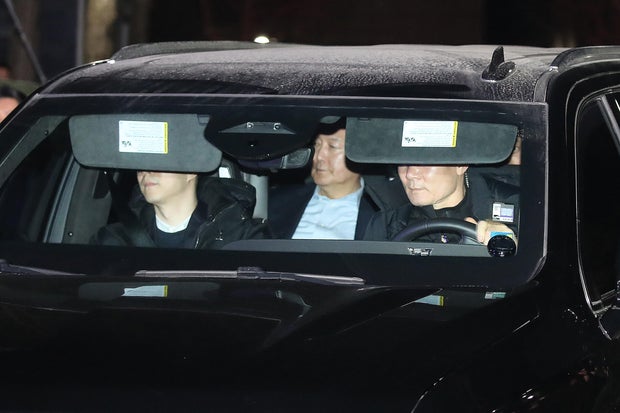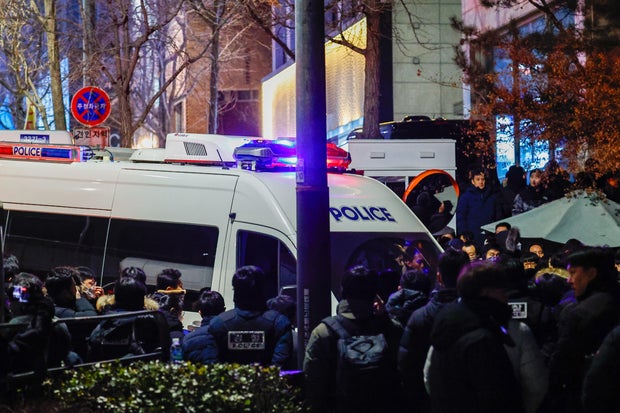A South Korean court has ordered the formal arrest of President Yoon who has been charged under martial law

The deposed president of South Korea, Yoon Suk Yeol, he was officially arrested on Sunday morning, days after being detained at the presidential compound in Seoul, as he faces possible arrest for his controversial declaration of martial law last month.
Yoon’s arrest could mean the start of an extended period in his custody, which could be months or more.
The Seoul Western District Court granted a legal request to arrest Yoon after hours of deliberations, saying he had threatened to destroy evidence. Yoon and his lawyers on Saturday appeared before the court judge during the trial and argued for his release.
Yoon, who has been in custody since his arrest on Wednesday in a major law enforcement operation at the compound where he lives, faces treason charges related to his declaration of martial law on Dec. 3, which had a major impact on the country. A serious political crisis since democratization in the late 1980s.
The Office of Corruption Investigation, which is leading the investigation in cooperation with the police and the military, can now extend his detention for up to 20 days, when they will refer the case to public prosecutors for charges.
Yoon’s lawyers may also file a motion to challenge the court’s arrest warrant.
Yoon’s appearance at the Seoul Western District Court sparked chaos in nearby streets, where thousands of his ardent supporters gathered for hours demanding his release. They clashed with the police who arrested about 40 protesters, including about 20 who climbed the fence trying to go to court. At least two cars carrying anti-corruption investigators were damaged when they left the courthouse after a scuffle demanding Yoon’s arrest.
/ Getty Images
Yoon’s lawyers said he spoke for about 40 minutes with the judge during the nearly five-hour trial. His legal team and anti-corruption agencies have presented conflicting arguments on whether he should be jailed. Lawyers did not share his specific comments.
The judge is expected to issue a decision late Saturday or early Sunday. Yoon’s cars were seen leaving the court on Saturday evening heading to the detention center, where Yoon will await the verdict.
Yoon was brought to the court from a center in Uiwang, nearby Seoul, in a green Justice Department van escorted by police and the president’s security detail.
Cars poured into the parking lot below the courthouse as thousands of Yoon’s supporters gathered in the nearby streets despite a police presence. Some protesters broke through the police lines and knocked on the windows of his van that was going to the court. Yoon did not speak to reporters.
After its investigators were attacked by protesters, the anti-corruption agency asked media companies to hide the faces of its members who attended the meeting.
It was unclear as of Saturday morning whether Yoon would choose to stand trial.
Defense lawyers met with Yoon at the detention center and he accepted the advice of his legal team to appear in person before the judge, said Yoon Kab-keun, one of the president’s lawyers. The lawyer said the president must state that his decision is to exercise his power legally and that the allegations of treason will not proceed before the criminal court or the Constitutional Court, which is considering whether to legally remove him from office or restore him to office.
Daniel Ceng/Anadolu via Getty Images
Nine people, including Yoon’s defense minister, a police chief, and several top military commanders, have been arrested and charged for their role in enforcing martial law.
When did the problem start? Yoon, in an attempt to break the law, imposed martial law and sent soldiers to the National Assembly and electoral offices. The standoff lasted several hours after lawmakers managed to pass a deadlock and vote to approve the measure. The opposition-dominated assembly voted to impeach him on December 14.
If Yoon is formally arrested, it could mark the start of a long period in his cell, lasting months or more.
If prosecutors charge Yoon with treason and abuse of power, which are still being examined by investigators, they could detain him in custody for up to six months before a trial.
Under South Korean law, planning treason is punishable by life imprisonment or the death penalty.
Yoon’s lawyers have argued that there is no need to detain him during the investigation, saying he is not a threat to flee or destroy evidence.
Source link




